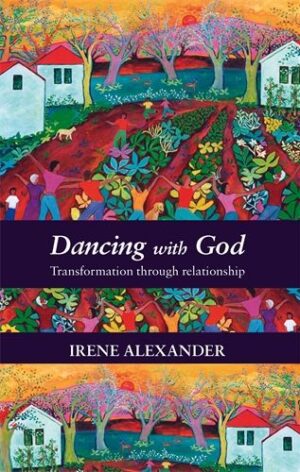



The beginning of the chapter talks about the idea that we need to see both our strengths and weaknesses, our beauty and power as well as our darkness and shadow. Paul, in Romans 12:3 exhorts us not to think of ourselves more highly than we ought, but to think with “sober judgement,” that is accurately, – we are not to think of ourselves as less than God made us either. Are you someone who tends to think less than you ought of yourself, or to exaggerate? Do you have people in your life who will help you think soberly and honestly? Think of someone in your life who is good at encouraging you to be all that God made you to be.
Discuss the idea of true humility being seen for who we are. How can you cultivate this true humility? Is your group able to give each other honest, encouraging and loving feedback?
If, as Irenaeus said, the glory of God is a human fully alive what does that mean for you as a dance partner with God?
Remember figure 1 in chapter 4 – the false self who is constantly measuring herself against the requirements set up in childhood, and who therefore is also evaluating other against those requirements. At this stage in the book, and after some time being in the group, have you noticed any changes in yourself in terms of the way you evaluate self and other?
What do you think of the possibility of living less in hierarchical relationships and more in true community, developing side-by-side relationship rather than top-down, accepting rather than evaluating?
Scott Peck’s book, The Different Drum, explores the stages of community making. He describes pseudo-community, chaos, and emptiness as the necessary steps to true community. Many of our students have commented that they see their churches as being in pseudo-community, where everyone is nice to each other but don’t really remove their masks.
What are your experiences of these stages? Do you experience true community in any context?
Are any of the organisations you are in more like the Ephesians 4 model depicted in figure 8?
What would have to change for you to be able to be more like this, rather than top down like figure 6?
Paul speaks of “truthing in love” in Ephesian 4:15. In which of your relationships do you experience this?
What would you need to make more relationships like this?
As you have read this book, and made yourself present to the stories of Jesus by using your imagination, what has changed for you? Has anything changed in your relationship with God?
Talk with your group about relational knowing and where you have experienced it.
The stories of Jesus that we looked at in this book have hopefully helped us encounter Jesus more fully. I have written more about this in my book Practicing the Presence of Jesus: Contemporary Meditation.
As a group you may like to take any of the gospel stories and each imagine them, imagine yourself in them. Notice what happens as practice this way of being present to Jesus. Especially, allow healing to come to those parts of ourselves that are wounded, broken, scarred, frightened.
The other way to do this described in chapter 20 is to start with your own emotion. Your own feeling of loneliness, fear, anxiety, anger and so forth. As you stay as close as you can to that feeling, let it take you to a story. And then again, stay present to the story letting it speak to that part of yourself that needs God’s response.
You may like to continue as a group to practice being present to the gospel stories. Or if your present group is finishing, find some other people who would be willing to meditate in this way with the gospel stories.
That we all may say Maranatha! Come Lord Jesus!